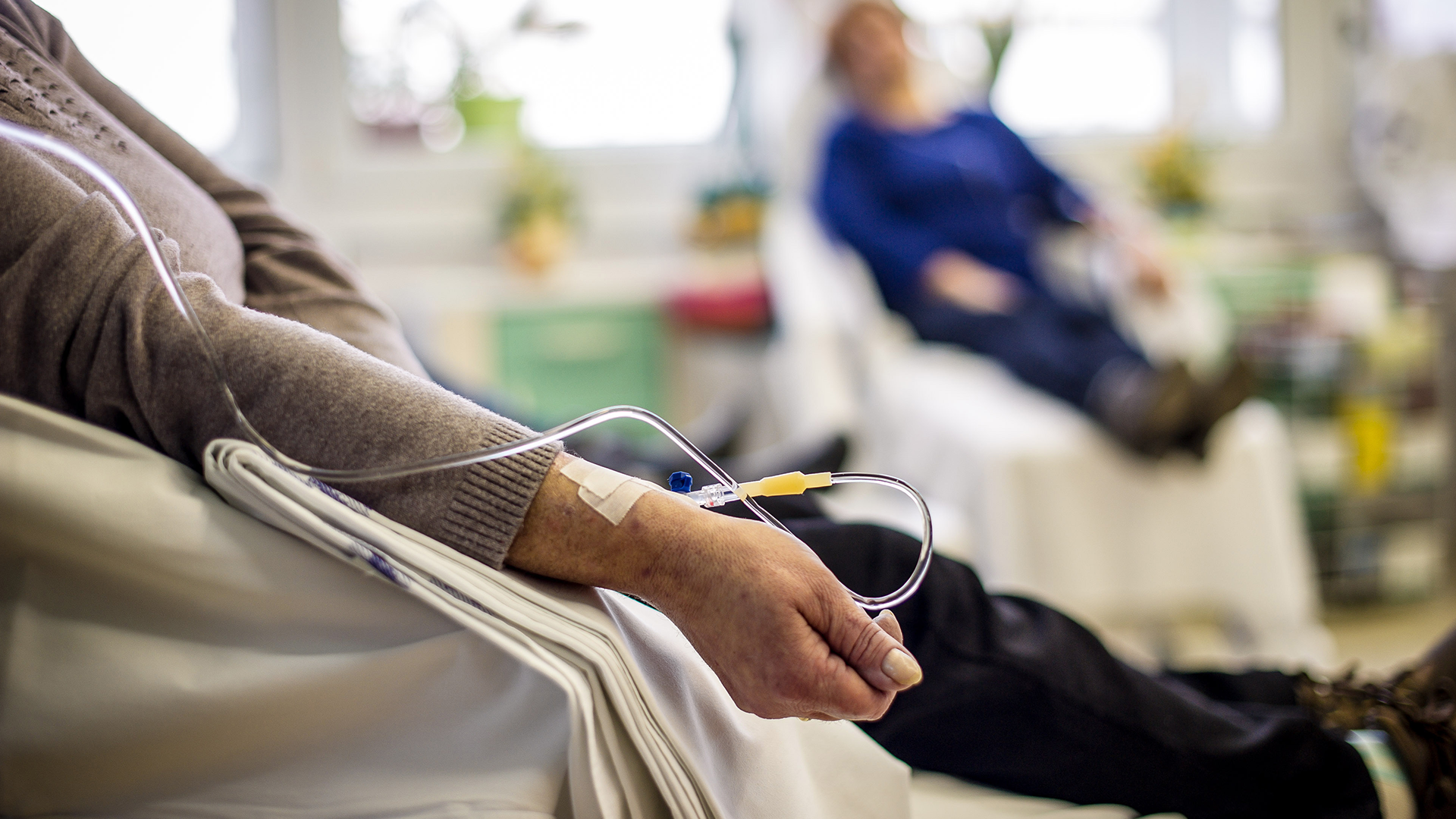
A new insurer tactic is hindering patient access to specialty drugs in Indiana and across the nation. It’s called “white bagging.” Recently, large health insurance companies have begun denying payment to health care providers and pharmacies unless they obtain specialty drugs from designated pharmacies who are often owned by or affiliated with the insurer, instead of the pharmacies clinicians normally rely on for quality and access. This practice, called white bagging, prevents health care providers from controlling the handling, preparation, dosage, and storage conditions of these drugs prior to administration.

Jessica Gendron, Indiana cancer patient
“Unfortunately, it is patients who are suffering from this ongoing issue,”
said Jessica Gendron, a Central Indiana cancer patient.
Based on a patient’s most recent lab result or changes in their condition, pharmacists often make last-minute adjustments to medications on the day of administration. But once a specialty drug is mixed and labeled for a patient, the drug generally cannot be adjusted; it must be discarded. To account for these last-minute adjustments, health care providers purchase specialty drugs from in-house or nearby pharmacies that can fill medication orders quickly and meet their safety standards. However, mandated white bagging prohibits this quality assurance.
Gendron, who was diagnosed with triple-negative stage 1 breast cancer in February at the age of 39, is just one of many whose care was delayed due to white bagging. Gendron’s health insurance company stopped covering a white blood cell boosting shot she needed to be infused at the hospital in between chemotherapy treatments to help her rebound from chemotherapy quicker and allow her to receive more regular treatments.
“After two treatments my insurance company decided to stop covering the shot at the hospital and wanted to mail the drug directly to my home for me to administer myself, which my oncologist deemed extremely unsafe,” said Gendron. “The drug can be compromised during shipping and there’s no way to tell if the drug has dipped below the acceptable temperature. If I give myself a drug that was compromised, it can make me really sick.”
Gendron says legislation is needed and will help patients like her, who have been subject to white bagging.
“What is most disheartening and aggravating is that the only people who lose in this scenario are people like me; people with cancer who are really sick and not only need these drugs to conquer cancer, but they need these drugs to survive,” Gendron said.
Kelsey Finch, an oncology pharmacist practitioner at Columbus Regional Health, sees safety issues firsthand.
 Kelsey Finch, oncology pharmacist
Kelsey Finch, oncology pharmacist “Our concern about white bagging is that we’re no longer able to monitor each hand that handles the medication. Representatives from pharmacies outside our health system who are not familiar with our hospital have been known to leave the medications unattended with the patients’ information. Our hospital had seven specific documented instances of specialty pharmacy deliveries not fully completed, including a package left outside the hospital department and not with any hospital personnel. If we can’t say the medicine is safe, we have an obligation not to give it to the patient,” Finch said.
Liz Leising, a nursing leader at Margaret Mary Health in Batesville, also sees the stress white bagging brings.

Liz Leising, nursing leader
“Every chemotherapy patient whose insurance requires white bagging has seen a delay, with five patients experiencing a delay of a week or more,” said Leising.“One patient’s medication was delayed more than three weeks due to the inefficient white bagging process our team is required to follow.”
As this issue continues to hinder patient care, a new coalition has been formed to bring attention to the concerning practice.
Hoosiers for Safe Meds, which represents patient and provider organizations across Indiana, has come together to establish guardrails around mandatory white bagging policies to preserve quality and patient safety and ensure care is not delayed for Hoosiers.
Last session of the Indiana General Assembly, the legislature validated white bagging concerns in HEA 1405, which required the Indiana Department of Health, in consultation with the Indiana Board of Pharmacy, the Indiana Department of Insurance, and the Indiana Family and Social Services Administration, to examine and report to the legislature on the safety of mandatory white bagging. Policymakers tasked state agencies with the report after hearing patient and provider testimony during the 2021 session claiming long delays in care resulting from these policies. A growing number of states have passed legislation or have taken administrative action to regulate the practice, including Louisiana, who passed a law this spring banning health insurance companies from requiring drugs to be white bagged.
Report Identifies Patient Safety Risks Associated with Insurer White Bagging Policies
On July 1, the Indiana Department of Health released to the Legislative Council the state agency report, which identified patient safety risks associated with insurer white bagging policies.
“Patients who are already dealing with catastrophic and life-altering illness should not be asked to suffer the additional distress and harm of delayed or missed treatment,” the report said. “Indiana has more work to do to protect and provide the best outcomes for our citizens.”
According to the report, “drug shipments can be delayed, sometimes by several days, thereby impacting chemotherapy schedules for oncology patients. Prior authorization and network issues not only place significant time and labor burden on health care personnel but also result in delayed treatment.”
The report identifies best practice guidelines, including legislative efforts other states have taken to regulate or prohibit white bagging.
“The Massachusetts report to the legislature concluded that drugs requiring sterile compounding by a pharmacist are not appropriate for white bagging as determined by [the Massachusetts] Board of Pharmacy.”
The report concluded by expressing the need for the Indiana legislature to take action to protect patients.
“The impact on patient safety, health outcomes, and overall cost to the system must be considered as policies are developed,” the report said.
Darren Covington, executive vice president of the Indiana Pharmacists Association and chairman of Hoosiers for Safe Meds, is dedicated to educating the public about safety issues created by white bagging.
 Darren Covington, Executive Vice President of the Indiana Pharmacists Assoc.
Darren Covington, Executive Vice President of the Indiana Pharmacists Assoc.
“Insurance companies have represented that these measures will reduce costs, but when it comes to patient safety, no cost-saving measure is worth the risk,” said Covington.“Through collaboration, we can find ways to reduce health care costs without sacrificing quality.”
During the interim, Hoosiers for Safe Meds is
urging state elected officials to protect their residents against unsafe white bagging policies mandated by insurers.
“Given the rapid expansion of these policies, Indiana should move quickly to establish guardrails around these practices to protect the growing number of Hoosiers caught in the line of fire. Not only will these policies result in delayed patient care and wasted drug costs, but they will add administrative costs to the health care system due to rescheduling critically ill patients.”
Gendron says she is most concerned for others with complex diseases who are not able to speak up and advocate for themselves.
“What’s most disheartening is that the only people who lose in this scenario are people like me who are really sick and not only need these drugs to conquer cancer, but they need these drugs to survive,” she said.
Covington says the report findings and best practice guidelines are a great place for policymakers to start as they consider legislative action next session.
“These aren’t just hypothetical situations, but patients’ lives are actually being impacted by this practice,” Covington said.
